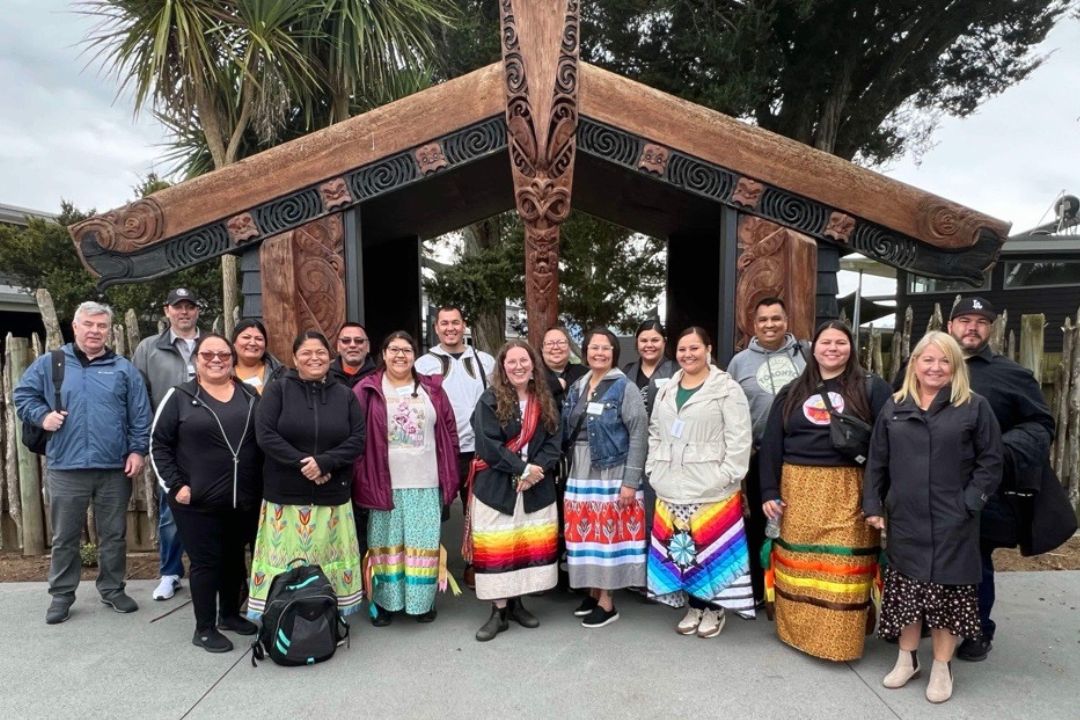
Students learn about colonization, decolonization and education through New Zealand study abroad course
Two participants reflect on their experiences visiting and learning from the Māori people of Aotearoa
By Jade Hupé and Saalimah SaeedThis past August, 19 students from the University of Saskatchewan (USask) had the opportunity to learn about reconciliation in education through the experience of the Māori people of New Zealand. The group spent 12 days in August visiting K-12 schools and post-secondary institutions to learn about the local culture and how the education system promotes Māori culture and language. Facilitated by associate professor in educational administration Dr. Michael Cottrell, the course included students in the Master of Education (Indigenous Educational Leadership cohort) and others.
The objective was to reflect on Saskatchewan and Canada’s educational systems while comparing them with New Zealand’s curriculum and current processes of decolonization and reconciliation.
Teacher and College of Education graduate Jade Hupé (BEd’19) and Saalimah Saeed (MEd’18), staff member in the International Student and Study Abroad Centre, made the trip south to expand their learning and gain new insights that would fuel their own decolonial practices in Saskatchewan. They reflected on their experience and the steps they are taking towards decolonization and reconciliation:
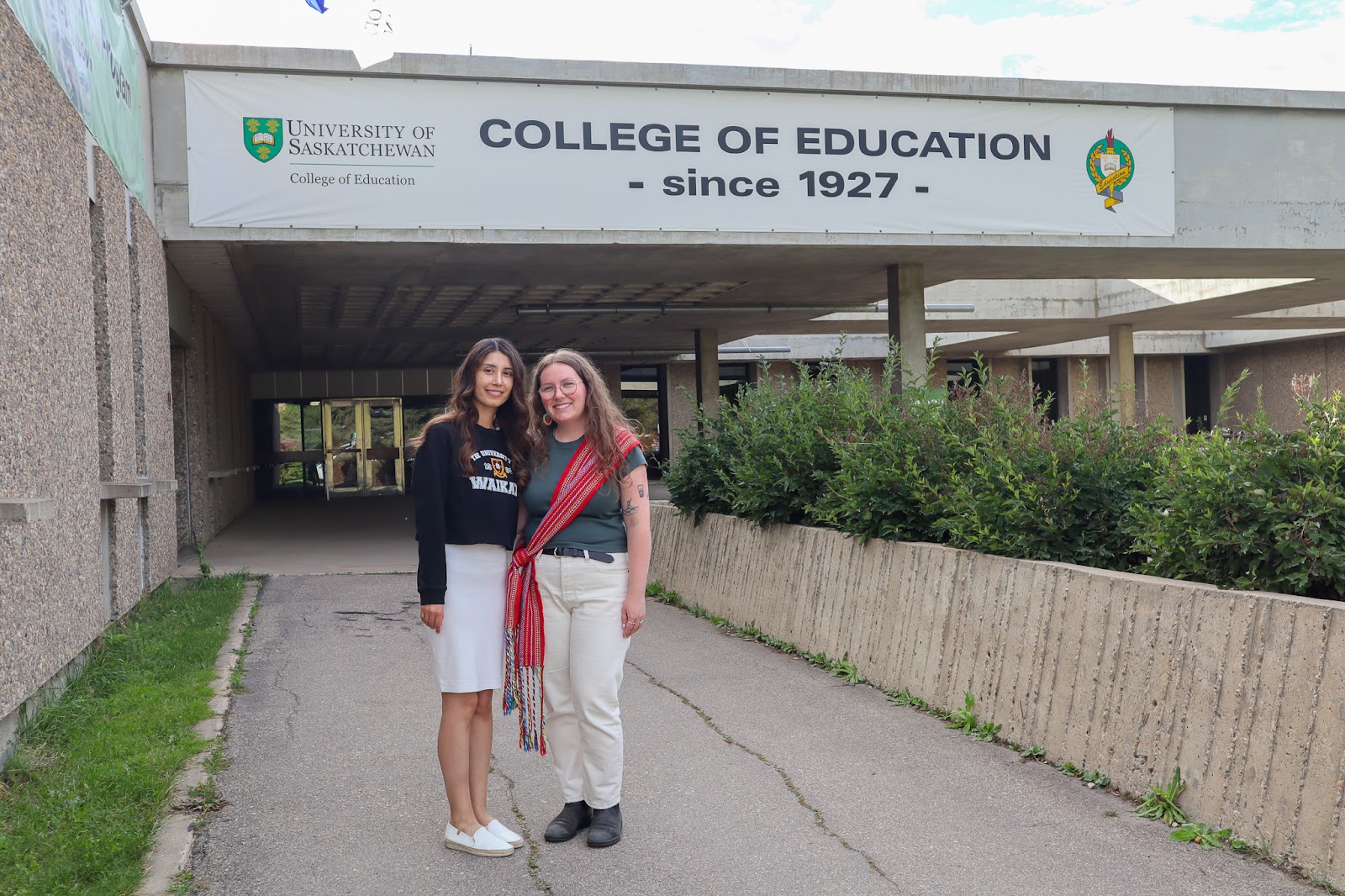
Kia Ora from Jade and Saalimah! In the Te Reo Māori language, this greeting is more than just a simple 'hi' — it's a warm expression of good wishes and well-being, a heartfelt way to connect and share positive energy. As we share our study abroad journey with you, we hope it brings the same spirit of kindness and positivity that this greeting holds.
We refer to New Zealand as Aotearoa. Aotearoa is the beautiful Te Reo Māori name for New Zealand, meaning “Land of the Long White Cloud.” This name reflects the profound connection the Māori people have with their land. By using Aotearoa, we hope to honour and show respect for the rich history and deep roots of this place.
Seeing firsthand how Aotearoa works to decolonize its educational spaces re-energized our hopes for decolonized education in Canada. Similar to Indigenous people in Canada, Māori have been suffering the intergenerational effects of colonialism such as their language, culture and land being stolen from them. The effects continue to affect the Māori. Witnessing and hearing these experiences from the Māori created a mutual understanding, kinship and respect between our Indigenous peoples. The similarities enabled us to develop relationships that can be mutually beneficial when it comes to decolonization strategies.
Throughout our studies, we had the opportunity to visit various schools to better understand how they were integrating Māori culture and language for all students. During these visits, one message continued to stick out: a reminder to be bold and take risks. Decolonization does not happen in a day and it will take many small, brave steps from everyone. Each school had varying levels of cultural integration, but the critical factor was simple: they were trying. This experience inspired us to remember that all steps towards decolonization are important.
We have formed a deep, lifelong friendship with the groups we met and are profoundly grateful for the opportunity to share a space where we could learn and grow together. Our identities intersected in meaningful ways, overlapping yet remaining distinct.
As an immigrant, I (Saalimah) carry with me the legacy of British colonialism from my homeland, Pakistan, while Jade’s lived experience as a Métis woman in Canada embodies the weight of ongoing colonialism. Despite the geographical and historical differences, our shared struggles for cultural survival forged a deep connection, revealing how intertwined our experiences truly are. Our shared experiences of cultural straddling helped us see the parallels between Indigenous struggles for decolonization and the ongoing challenges that immigrants face when dealing with the remnants of colonial systems in new lands.
We’ve come to recognize how often educational spaces can be siloed. While there is value in creating spaces dedicated to specific groups, our experience has revealed the immense joy and richness that arise when different cultures and stories come together. In sharing our stories of cultural preservation, we not only exchanged knowledge but also became allies in one another’s journey toward decolonization. Together, we will continue to challenge colonial legacies and carve out spaces for healing and growth.
This study abroad opportunity embodied the goals of similar programs at USask like Building Bridges, which brings together international, Indigenous and domestic students and allows for deep, meaningful connections between participants. These initiatives not only encourage dialogue but also help build meaningful connections across different cultures and are vital for creating spaces that foster decolonization.
- Saalimah and Jade
Sharing the Māori language
pōwhiri: traditional Māori welcome ceremony
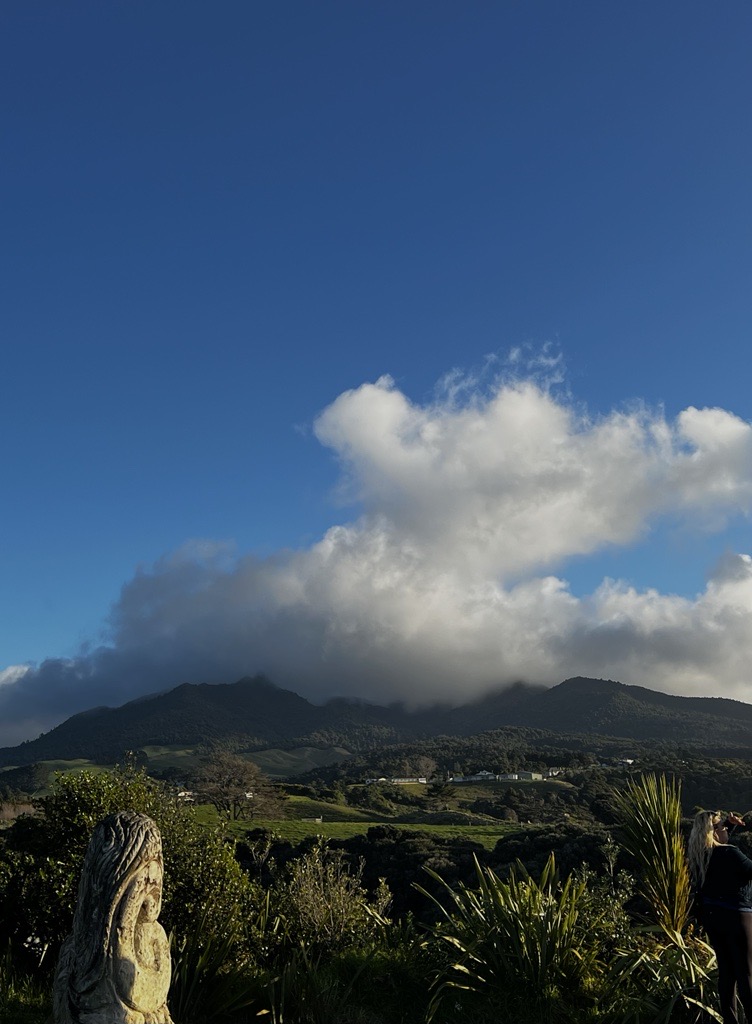
Attending a pōwhiri—the traditional Māori welcome ceremony—was one of the most profound moments of my time in Aotearoa. What really stayed with me wasn’t just the beauty of the ceremony itself, but the depth of meaning behind the words "pō", meaning night, and "whiri", meaning to stir. The pōwhiri is meant to "stir the night"; symbolically transforming the unknown into the known, turning strangers into friends and allies. This understanding added layers to the experience, making it feel not just like a welcome, but a powerful moment of connection and transformation.
I was particularly moved to learn that the pōwhiri is performed for new students at the University of Waikato, including international students. It’s a beautiful way to weave Māori tradition into the heart of the student experience, helping everyone feel like they belong from the moment they arrive. This made me reflect on our own practices at the University of Saskatchewan. Could we incorporate Indigenous traditions to welcome and decolonize our space? By drawing on Indigenous ways of being, we could create a sense of belonging that connects students to the land, the people and the rich cultures of Saskatchewan, while actively reshaping our spaces to reflect and honor Indigenous knowledge and perspectives.
- Saalimah
ako - to learn, study, instruct, teach, advise
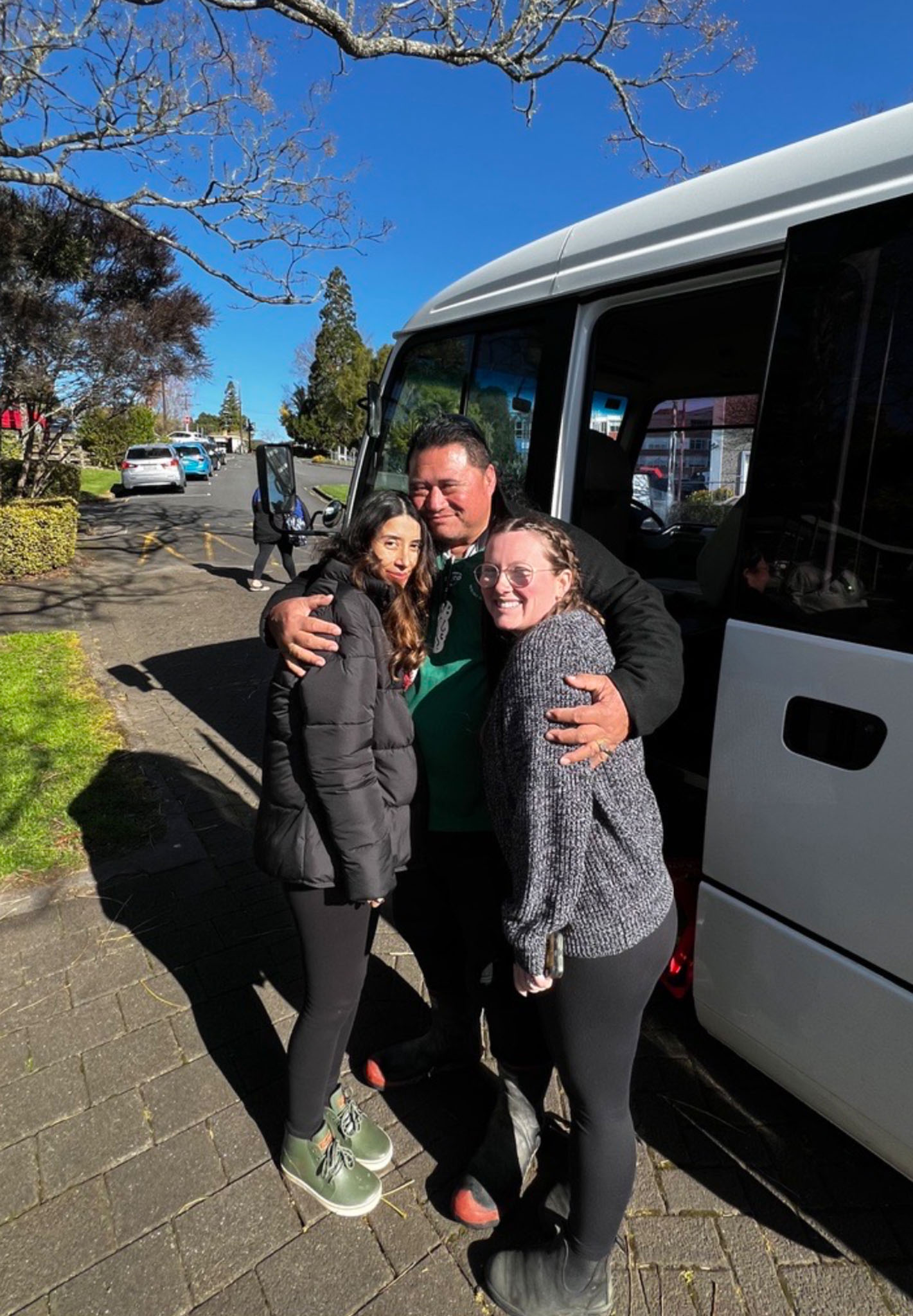
While in Aotearoa, I discovered the importance of decentering myself when developing relationships. In Western culture, there is a strong emphasis on self-care. When developing relationships, this idea translates to deciphering what one will gain from this relationship and how it will benefit them. Before studying abroad, I often approached relationships with a transactional framework, wondering what was to be achieved in the partnership. In Aotearoa, I was shown the utmost kindness from Māori, Pākehā (New Zealanders with European ancestry), and my new friend, Saalimah. I was initially uncomfortable as kindness came with no expectation of reciprocity. However, I began wanting to emulate the level of care I had been shown to others around me, as I wanted them to experience the same compassion I felt.
As I challenged myself to invite others in without expecting anything, I saw a positive relationship change. These changes were rooted in trust and care, which led to more authentic experiences and interactions. Through this experience, I saw how caring for others, or community-care, in relationships has had far more positive impacts in comparison to self-care. I continue to work on adapting this new mindset as I interact with others to ensure I am decentering myself and embracing the opportunities that arise from community-care.
- Jade
manaakitanga—creating holistic spaces where every student feels at home
Manaakitanga, at its heart, is about more than hospitality. Rooted in Māori culture, it encompasses genuine care, kindness and compassion. It’s a commitment to making others feel welcome, supported, and valued—a way of living that prioritizes connection, respect and the wellbeing of others. While the hosts offer care, visitors are expected to honour and respect that hospitality and foster a mutual exchange that uplifts the “mana” (dignity) of both parties.
Experiencing manaakitanga during my time in Aotearoa profoundly impacted me, especially in relation to my work with international and refugee students. While I’ve always strived to make students feel at home, witnessing this concept in action renewed my ambition to do even more. Manaakitanga reminds me that creating a supportive environment isn’t just about addressing academic needs—it’s about ensuring students feel safe, cared for and included in every aspect of their lives.
This perspective deepened even further when I learned about the Pastoral Care of Tertiary and International Learners Code of Practice 2021 at the University of Waikato. The code outlines the university's commitment to student wellbeing, safety and success, taking a holistic approach to care. It is a formalized expression of manaakitanga—a plan that ensures every student, domestic or international, feels supported not just academically, but emotionally and socially as well.
I now feel more committed than ever to foster an environment that not only welcomes students but also nurtures their overall wellbeing. By embracing manaakitanga and developing a holistic and caring plan for the student experience, we can create spaces where every individual feels truly at home, connected to the land, the people and the community.
- Saalimah
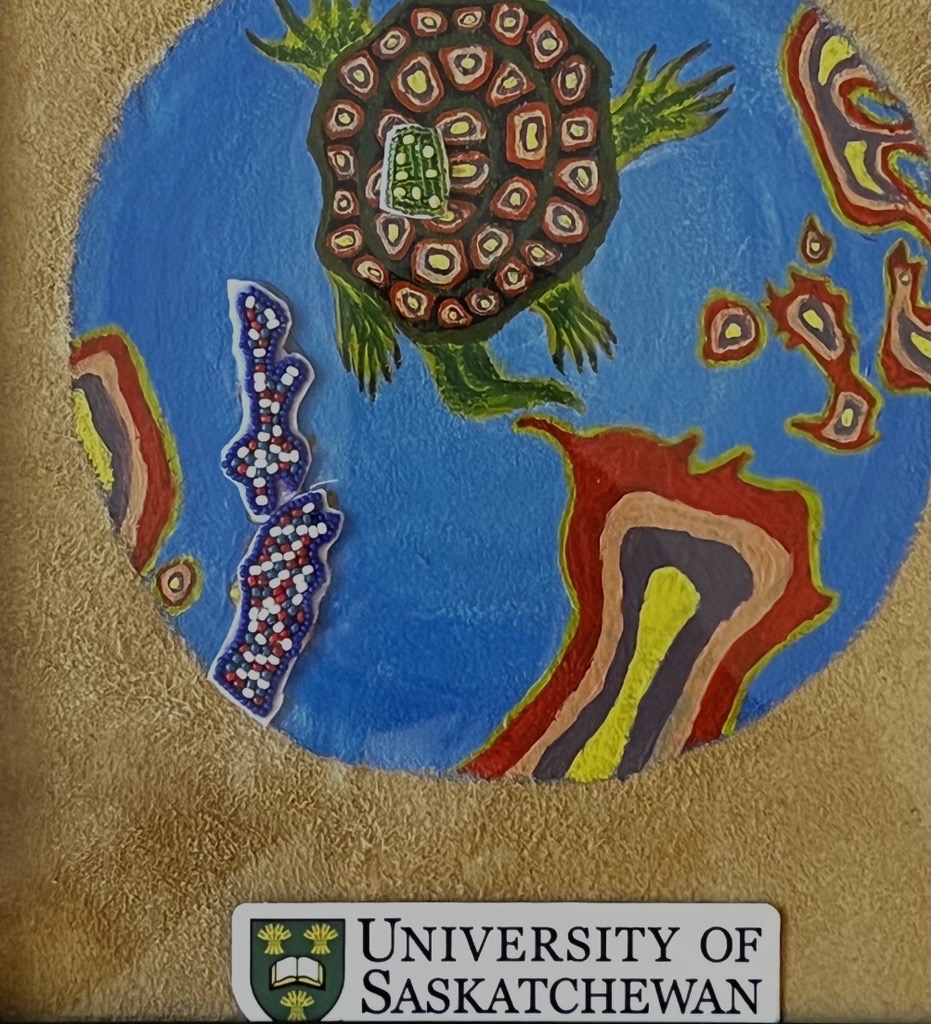
This study abroad opportunity would not have been possible without the support from the USask Global Engagement Scholarship and Indigenous Student Travel Award (Jade) and Charlene Brown (director of ISAAC), whose openness and encouragement allowed me (Saalimah) to fully embrace this opportunity.
Our deepest gratitude to Dr. Vicki Squires and Dr. Michael Cottrell from USask and Dr. Chris Eames and Charlotte Blackwell from the University of Waikato, for their incredible work in co-developing and facilitating such a meaningful study abroad experience. And a heartfelt thank you to our amazing bus driver, Tom, who brought us cake, sang songs and made us feel truly at home. Tom’s warmth and kindness embodied the spirit of manaakitanga.
Shukria, maarsii and thank you for making our journey so special.
- Saalimah and Jade
This article has been edited for length and clarity.

